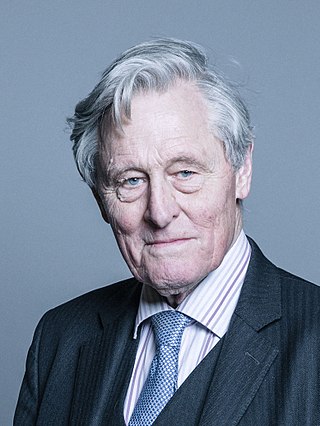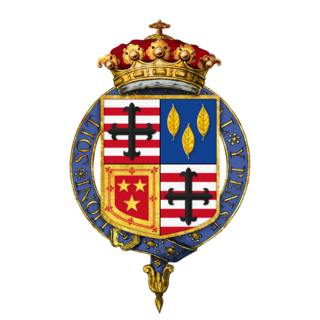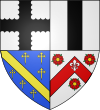The order of precedence in the United Kingdom is the sequential hierarchy for Peers of the Realm, officers of state, senior members of the clergy, holders of the various Orders of Chivalry, and is mostly determined, but not limited to, birth order, place in the line of succession, or distance from the reigning monarch. The order of precedence can also be applied to other persons in the three legal jurisdictions within the United Kingdom:

The Lord Steward or Lord Steward of the Household is one of the three Great Officers of the Household of the British monarch. He is, by tradition, the first great officer of the Court and he takes precedence over all other officers of the household.

General James St Clair-Erskine, 2nd Earl of Rosslyn, was a Scottish military officer, politician and peer who served as Lord President of the Council from 1834 to 1835.

James Graham, 8th Duke of Montrose,, styled as Earl of Kincardine until 1954 and Marquess of Graham between 1954 and 1992, is a Scottish peer and Conservative politician in the House of Lords.

Earl of Rosslyn is a title in the Peerage of the United Kingdom. It was created in 1801 for Alexander Wedderburn, 1st Baron Loughborough, Lord Chancellor from 1793 to 1801, with special remainder to his nephew Sir James St Clair-Erskine, as Wedderburn had no surviving issue of his own. Wedderburn had already been created Baron Loughborough, of Loughborough in the County of Leicester, in the Peerage of Great Britain in 1780, with normal remainder to the heirs male of his body, and Baron Loughborough, of Loughborough in the County of Surrey, in the Peerage of Great Britain in 1795, with the same remainder as the earldom. The 1780 barony became extinct upon his death, but the 1795 barony and the earldom passed, by the special remainder, to his nephew, who thus became the second Earl of Rosslyn. The second Earl was a Lieutenant-General in the Army and also held political office as Lord Privy Seal and Lord President of the Council.

Arthur Charles Wellesley, 4th Duke of Wellington,, styled Lord Arthur Wellesley from 1884 to 1900, was a British peer and politician, and a member of the well-known Wellesley family. He joined the military and served in the Household Division. Upon his childless brother's death in 1900, he inherited the family title and estates.

Alexander Henry Scrymgeour, 12th Earl of Dundee,, is a Scottish peer, Conservative politician and Chief of the Clan Scrymgeour.
John Wodehouse, 4th Earl of Kimberley, styled Lord Wodehouse between 1932 and 1941, was an active British peer, and also a bobsled racer and Cresta member.

Charles Henry John Benedict Crofton Chetwynd Chetwynd-Talbot, 22nd Earl of Shrewsbury, 22nd Earl of Waterford, 7th Earl Talbot,, styled Viscount Ingestre until 1980, is an English nobleman and the Lord High Steward of Ireland. He is the premier earl in the Peerage of England as the Earl of Shrewsbury, and in the Peerage of Ireland as the Earl of Waterford (1446). He also holds the titles of Earl Talbot and Baron Talbot.

Margaret Alison of Mar, 31st Countess of Mar, is a Scottish hereditary peer and politician. She was a crossbench member of the House of Lords from 1975 to 2020 and was one of 92 hereditary peers elected to remain in the Lords in 1999. She is the holder of the original earldom of Mar, the oldest peerage title in the United Kingdom. She is the only suo jure countess and was the only female hereditary peer in the House of Lords from 2014 to 2020. She is also a farmer and former specialist goats cheesemaker in Great Witley, Worcestershire.

Cromartie Sutherland-Leveson-Gower, 4th Duke of Sutherland,, styled Lord Cromartie Sutherland-Leveson-Gower until 1858, Earl Gower between 1858 and 1861 and Marquess of Stafford between 1861 and 1892, was a British peer and politician from the Leveson-Gower family.

George Granville Sutherland-Leveson-Gower, 5th Duke of Sutherland, KT, PC, styled Earl Gower until 1892 and Marquess of Stafford between 1892 and 1913, was a British courtier, patron of the film industry and Conservative party politician from the Leveson-Gower family. He held minor office in the Conservative administration of Bonar Law and Stanley Baldwin in the 1920s and was later Lord Steward of the Household from 1935 to 1936. As a noted patron of the British film industry, the Sutherland Trophy, awarded by the British Film Institute, is named in his honour.
General James Alexander St Clair-Erskine, 3rd Earl of Rosslyn PC, DL, styled Lord Loughborough from 1805 to 1837, was a Scottish soldier and Tory politician. A General in the British Army, he also held political office as Master of the Buckhounds between 1841 and 1846 and again in 1852 and as Under-Secretary of State for War in 1859.

David Alexander Cospatrick Douglas-Home, 15th Earl of Home, was a British banker and hereditary peer. He was a Conservative member of the House of Lords from 1996 until his death in 2022.

William James Robert Peel, 3rd Earl Peel,, styled Viscount Clanfield until 1969, is a British hereditary peer who was a Conservative peer from 15 May 1973 until October 2006 when, on his appointment as Lord Chamberlain of the Royal Household, he became a crossbench (non-partisan) member of the House of Lords.

James Patrick Montagu Burgoyne Winthrop Stopford, 9th Earl of Courtown, styled Viscount Stopford between 1957 and 1975, is an Irish peer and politician. He is one of the 92 hereditary peers elected to remain in the House of Lords after the House of Lords Act 1999 and sits for the Conservatives.
Jeremy Ulick Browne, 11th Marquess of Sligo, styled Earl of Altamont until 1991, was an Irish hereditary peer and businessman. On the death of his father, he was entitled to sit in the House of Lords by virtue of the subsidiary title Baron Mounteagle, in the Peerage of the United Kingdom. However, he never took his seat and lost the right with the passage of the House of Lords Act 1999.
Anthony Hugh Francis Harry St Clair-Erskine, styled Lord Loughborough from 1929 to 1939, was a British peer. The Earl's lands included the noted Rosslyn Chapel.
The order of precedence in Ireland was fixed by Royal Warrant on 2 January 1897 during Ireland's ties to the United Kingdom of Great Britain and Ireland.

In the United Kingdom, the Great Officers of State are traditional ministers of the Crown who either inherit their positions or are appointed to exercise certain largely ceremonial functions or to operate as members of the government. Separate Great Officers exist for England and Wales, Scotland, and formerly for Ireland, though some exist for Great Britain and the United Kingdom as a whole.
















